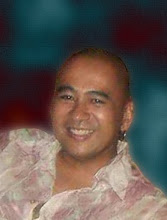
Some of the best Dharma teachings I ever received were not in a formal setting of a pura or gompa, but in those magical moments when I had the opportunity to just sit and listen to Ratu. Sometimes these teachings would take place at a cafe, beach or more often in his kitchen; basically anywhere his whim would take him and like all his students, I was happy to go anywhere just to be near him.
I adored Ratu. He was my father, mother, brother, best friend, teacher and master all rolled into one. He was kind, compassionate, wise, cheeky, irreverent and just plain fun to be around with. In my confusion or joy he always had something relevant to say about life, its purpose and meaning. I was enthralled by his beautiful vision of the world around him, and his good humour even in the face of death.
He passed away in the winter of 2004 after a long and protracted illness. I feel fortunate to have been able to look after some of his basic needs before his untimely passing. During this period Ratu still continued to teach his students, sometimes from his sick bed.
I never fully appreciated his boundless compassion until I had a knee injury and was bedridden for two weeks. Despite my regimen of painkillers I was in so much pain that sometimes I punched my bedroom wall just to feel something other than the relentless throb in my knee.
In wondrous awe and admiration I later asked Ratu how he was able to keep teaching and helping others despite being in constant pain for almost four years, sometimes risking his own health in the process. I had been in pain for two weeks; the last thing on my mind was the happiness and welfare of others.
He just smiled, winked, and said, "That's because you don't know what it feels like to be one with your Love".
It's this one sentence that inspires me in my practice of the Dharma. I often contemplate what it must feel like to be enlightened, where even one's own life pales in significance to one's feeling of love and compassion - not only towards one's loved ones (which is easy), but to all beings without exception. O Lama of Unrepayable kindness, I always remember you.
Following are some questions I have asked over ten years of practice and Ratu's beautiful and sometimes painful answers. (Please bear in mind that these are my interpretations of Ratu's answers and not his words verbatim). I hope they can help you on your own journey of self discovery.
Q) How do I stop seeking approval from others all the time? I get angry at myself because I find myself being frightened of being disliked even by people I don't respect.
It's stupid to seek approval from others. Some people’s approval is not worth gaining because it's based on their ignorant beliefs on what is right or wrong.
You only need to find approval from within yourself. Follow the feeling in your heart. Always ask yourself what you like or what you would like to do in all situations.
Q) I am easily hurt by people's harsh words and inconsiderate behaviour and it bothers me that I take things too personally and feel stupid for being so sensitive. How do I stop resenting people who treat me unfairly?
First of all, do not judge yourself for being sensitive. Sensitivity is the depth of one’s appreciation and the energy of appreciation can take one to Enlightenment.
Be aware that you cannot trust your own mind, let alone the minds of others. I certainly don't trust my mind.
Take responsibility for your own feelings. Remember that your thoughts and emotions influence your feelings.
Simply relax and feel the pain of it. Allow it to pierce your heart, then a feeling of compassion will arise.
Q. What is true happiness? What does it feel like?
True happiness is freedom from suffering from a realisation of the Four Noble Truths. What does it feel like? I will draw you a map:
1. You are no longer a slave to your thoughts and emotions. Your heart is at peace and full of compassion for others. Caring for others is effortless and brings you great joy.
2. You experience life with a bubbling feeling of enchantment.
3. You have completely mastered your mind. You become your Awareness. Your thinking mind is stable and no longer wanders.
4. There is no sadness any longer in taking responsibility for others.
5. You feel no fear, except for the fear of death. This fear makes you appreciate the preciousness of your life.
6. Wealth comes to you effortlessly but you are not attached to it. You feel comfortable where ever you are, whether it is staying in a palace or a village hut.
7. Your sexuality increases and you begin to like yourself more and more. You begin to adorn yourself with jewelery and wear beautiful clothes.
8. There are no concepts in your mind any longer. You experience life directly without the filter of ego.





